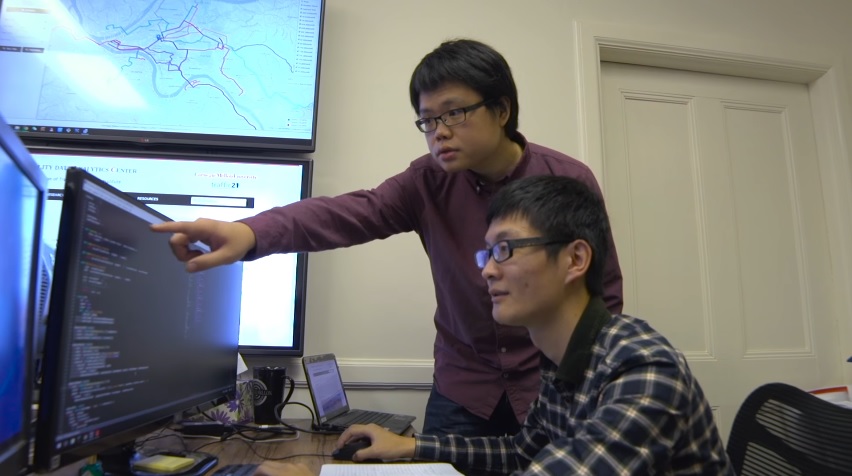UC Davis Alum Sean Qian Pursues his Passions: Research, Data and Teaching at Carnegie Mellon
By Alicia Nguyen
After graduating from the UC Davis, Zhen (Sean) Qian (Ph.D., Civil Engineering, 2011) is today pursuing his passion: teaching, conducting research and studying transportation data as an Assistant Professor in Civil and Environmental Engineering at Carnegie Mellon University (CMU).
Qian has a long history of research that dates back to his time with ITS-Davis, during which he was active at the UC Davis Institute of Transportation Studies (ITS-Davis) and studied civil engineering under faculty adviser and resident UC Davis professor Michael Zhang. While at Davis, Qian started a research project that has since expanded into an ongoing project on dynamic parking systems. Following graduation, Qian pursued a master’s degree at Stanford University while working as a post-doctoral researcher in Stanford’s Department of Civil and Environmental Engineering.

Professor Qian working with a student at Carnegie Mellon University.
“I went to Stanford and got my master’s degree in statistics because that was something I really wanted to pursue as part of my career, in terms of research,” Qian said. “A lot of the work I did at Stanford those two years consisted of some joint work with Stanford and UC Davis on transportation systems.”
Qian currently leads CMU’s Mobility Data Analytics Center, which conducts several projects that study transportation data gathered through several different agencies, such as city public works, state departments of transportation, and the Pennsylvania turnpike in order to create a platform that integrates this information for research. Qian is particularly interested in the way this data relates to how human society interacts with transportation systems.
 “My primary research interest is in mobility data analytics and the two words I’m going to use to explain this are networks and data,” Qian said. “In the recent 5-10 years, there has been a lot more access to data. Part of my research is gathering data from different parts of transportation so we can look at data in a very holistic way and take a look at mobility transportation. In networks, I’m more interested in how the policy or pricing or infrastructure change is going to bring change to the entire network. For example, let’s say you’re decreasing the transit fare—how would that type of infrastructure or pricing or policy have a network impact on passenger flow or transportation flow in terms of spatial and temporal dimensions?”
“My primary research interest is in mobility data analytics and the two words I’m going to use to explain this are networks and data,” Qian said. “In the recent 5-10 years, there has been a lot more access to data. Part of my research is gathering data from different parts of transportation so we can look at data in a very holistic way and take a look at mobility transportation. In networks, I’m more interested in how the policy or pricing or infrastructure change is going to bring change to the entire network. For example, let’s say you’re decreasing the transit fare—how would that type of infrastructure or pricing or policy have a network impact on passenger flow or transportation flow in terms of spatial and temporal dimensions?”
Despite his primary background in civil engineering, Qian emphasizes that he is able to fully pursue his passions in transportation research due to his exposure to a wide breadth of disciplines. Qian explains that this access to an interdisciplinary researching skill set is what makes ITS-Davis a great research institution.
“When you try to learn about transportation you really get to learn a lot about the engineering, supply, and demand, but you also really have to have your hands on several disciplines to have a real understanding of transportation,” Qian said. “I not only experienced the engineering side, I also got a lot of experience with the data mining, sensing, economics theory, policy of transportation and that all together makes me unique and well-prepared to do research.”
Qian advises students to take advantage of ITS-Davis’ interdisciplinary nature and broaden their views of transportation. He emphasizes the importance of trying something new in graduate studies and talking to various students, faculty and researchers at ITS-Davis. An international student from Tsinghua, Beijing himself, Qian especially extends this advice to other international students, encouraging them to open their eyes and explore in order to better learn about themselves.
Qian credits UC Davis with giving him the tools he needed to succeed, reminiscing not only about ITS-Davis and its prestige in the field of transportation, but also about the university’s nice weather and the college-town environment, which he fondly misses.
As to future prospects, Qian hopes to continue on the academic track, explaining the flexibility in research and projects that a faculty job provides. He plans on pursuing his passion in data and infrastructure systems for a long while.
“I’m going to keep going on this faculty track and it’s quite a mission. My goals are to educate the next generation and conduct cutting edge research on transportation planning and operations. In the future—in the next 5, 10, or 20 years, I hope to be more influential in this area with more theories and research to improve the quality of life. That’s my ultimate goal.”
The #AggiesAtWork series is done in partnership with the UC Davis Cal Aggie Alumni Association.
View other AggiesAtWork stories:

- For MTC’s David Ory, People & Community are Key to Transportation Planning
- Nevada Department of Transportation’s Sondra Rosenberg: Shaping Policies in the Public Sphere
- Ben Sharpe’s UC Davis Doctoral Degree Leads to Research Career in International Transportation
- UC Davis Transportation Alums: Changing California, Changing the World
Thank you for your interest in the UC Davis Institute of Transportation Studies. Subscribe today to keep up with the latest ITS news and happenings.
